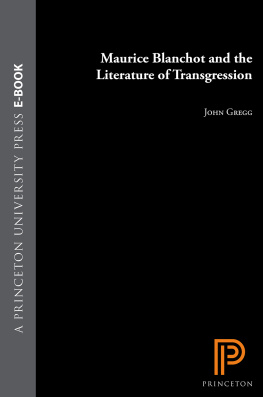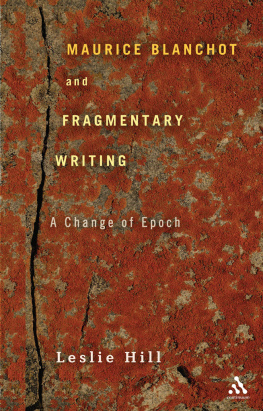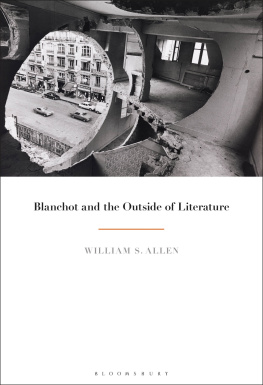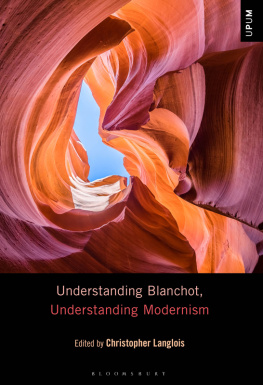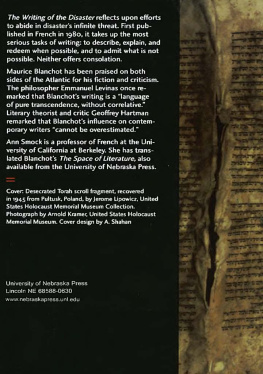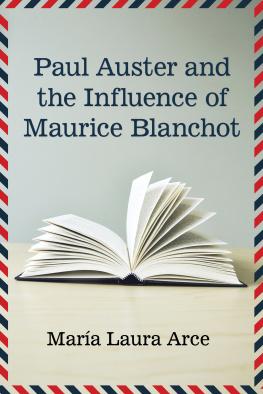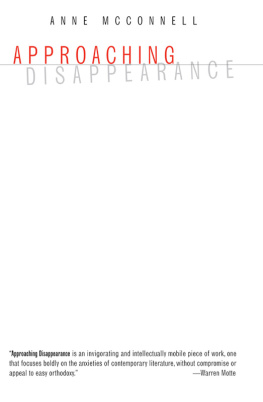MAURICE BLANCHOT AND THE LITERATURE OF TRANSGRESSION
MAURICE BLANCHOT AND THE LITERATURE OF TRANSGRESSION
John Gregg
PRINCETON UNIVERSITY PRESS
PRINCETON, NEW JERSEY
COPYRIGHT1994 BY PRINCETON UNIVERSITY PRESS
PUBLISHED BY PRINCETON UNIVERSITY PRESS, 41 WILLIAMSTREET,
PRINCETON, NEW JERSEY08540
IN THE UNITED KINGDOM: PRINCETON UNIVERSITY PRESS,
CHICHESTER, WEST SUSSEX
ALL RIGHTS RESERVED
LIBRARY OF CONGRESS CATALOGING-IN-PUBLICATIONDATA
GREGG, JOHN, 1954
MAURICE BLANCHOT AND THE LITERATURE OF TRANSGRESSION / JOHN GREGG.
P. CM.
INCLUDES BIBLIOGRAPHICAL REFERENCES AND INDEX.
eISBN 1-4008-0309-8
1. BLANCHOT, MAURICECRITICISMAND INTERPRETATION. I. TITLE.
PQ2603.L3343Z67 1994
843'.912DC20 93-30911
eISBN: 978-1-400-82127-3
R0
Pour Dominique
car nous sommes ce lecteur doublant un double et le
ddoublant en criture par un acte de rptition qui sollicite,
vaguement, quelquun qui puisse le rpter son
tour et son tour se mettre en qute dun
rptiteur peut-tre dfinitif...
Maurice Blanchot, LAmiti
ACKNOWLEDGMENTS
I GRATEFULLY acknowledge the original publishers of the following sections of this book: Blanchots Suicidal Artist: Writing and the (Im)Possibility of Death ( were published under the title Theoretical and Fictional Portrayals of Reading in Blanchot in Dalhousie French Studies 20 (1991): 7587. Reprinted by permission.
A NOTE ON SOURCES
Q UOTATIONS in French from Blanchot (and others) appear in the body of the text, and English translations have been provided in notes. Existing translations have been used whenever possible, although on occasion I have taken the liberty of slightly modifying them. All other translations from French sources (both Blanchot and others) were done by myself, with invaluable assistance from Dominique Froidefond, to whom I would like to express my thanks.
The following abbreviations have been used throughout to refer to the most frequently cited works by Blanchot and to their translations:
| AC | Aprs Coup |
| CI | La Communaut inavouable |
| ED | LEcriture du dsastre |
| EI | LEntretien infini |
| EL | LEspace littraire |
| FP | Faux Pas |
| GO | The Gaze of Orpheus |
| IC | The Infinite Conversation |
| LS | Lautramont et Sade |
| LV | Le Livre venir |
| PAD | Le Pas au-del |
| PF | La Part du feu |
| SL | The Space of Literature |
| SNB | The Step Not Beyond |
| UC | The Unavowable Community |
| VC | Vicious Circles |
| WD | The Writing of the Disaster |
MAURICE BLANCHOT AND THE LITERATURE OF TRANSGRESSION
INTRODUCTION
D WELLING at the crossroads where two literary discourses meet, one critical the other fictional, Maurice Blanchot has pursued a rigorous meditation on reading and writing that has spanned more than four decades. His first collection of critical essays, Faux Pas, was published in 1943 and is composed of nearly sixty articles written originally for publication in the daily Le Journal des Dbats. This assemblage is certainly the most eclectic of Blanchots critical works, and the subjects of his articlesfor the most part musings inspired by the latest releases of critical studies, translations, poetry, and fictionrange from da Vincis Notebooks and the French baroque poets to Gionos rendition of Moby Dick and Camuss LEtranger.
His second book of criticism, La Part du feu, appeared in 1949. Like the book that preceded it and the others that will followexcept for one, Lautramont et Sadeit is comprised of pieces that first came out in periodicals, in this case LArche and Critique, the review founded by his close friend Georges Bataille. The second book contains half as many essays as the first one, but they are longer and more fully developed. He covers less territory in the subjects he treats, choosing to deal only with writers of the nineteenth and twentieth centuries (with the exception of Pascal), and we can begin to discern the emergence of a kind of literary pantheon, exemplary writers to whom he will incessantly return in his future discussions of what he calls the approach to the space of literature: Mallarm, Kafka, Char, Hlderlin, and Nietzsche.
The next four books of criticism, LEspace littraire (1955), Le Livre venir (1959), LEntretien infini (1969), and LAmiti (1971) are made up almost exclusively of pieces he wrote during his stint as a regular contributor to the Nouvelle Revue Franaise from 1953 to 1968. Of these, the first three constitute the core of Blanchots theory of literature, and they are probably the best known of the works that form his critical corpus. Although they are compilations of previously published essays, they possess a thematic unity that the other collections do not: the essays are grouped into sections that have titles, and an implicit thread of argument ties these sections to each other in such a way that there is a sustained, progressive development throughout.
Existing alongside these critical works is a somewhat lesser read (but no less impressive) narrative oeuvre which has evolved, roughly speaking, through three successive stages: the novels of the 1940s, the rcits of the 1950s, and the fragmentary books (unclassifiable as purely narrative works) of the 1960s and 1970s. With respect to the latter, LAttente loubli is clearly more a narrative work than Le Pas du-del or LEcriture du dsastre, but the very fact that these works are nearly impossible to classify as either theoretical or narrative indicates that over the years the two complementary yet contradictory activities of critical and creative writing have tended to converge, resulting in a different kind of writing which, while not being totally indifferent to such categories as criticism and fiction, is irreducible to either of these categories and contests their ability to set up and define two different disciplines and orders of knowledge. If, in Blanchots writing, these traditionally distinct activities have encroached on each others territory, it is because their concerns are essentially the same: whether in the guise of novelist or critic, he seeks to plumb the depths of the mysteries of the origin of literature. As he explains in the preface to Lautramont et Sade, one thing that as a critic he does not do is to submit a work he is discussing to value judgments, whereby a writers success or failure could be measured against a set of standards extrinsic to the work imposed on the work by the critic:
La critique nest plus le jugement extrieur qui met louvrage littraire en valeur et se prononce, aprs coup sur sa valeur. Elle est devenue insparable de son intimit, elle appartient au mouvement par lequel celui-ci vient luimme, est sa propre recherche et lexprience de sa possibilit. (13)

